- Home
- Lisa Gardner
One Step Too Far Page 2
One Step Too Far Read online
Page 2
My name is Frankie Elkin and finding missing people is what I do. When the police have given up, when the public no longer remembers, when the media has never bothered to care, I start looking. For no money, no recognition, and most of the time, with no help.
I have no professional training. I’m not a former detective or registered PI or ex–anything special. I’m only me. An average, middle-aged white woman, short on belongings, long on regret. I tried real life once. There was a house, a job, even a man who loved me enough to hold my hand as I fought my way to sober.
In the end, the walls closed in; the relentless sameness drowned me. And the man who loved me . . .
One day, a woman in my AA meeting talked about her daughter who’d disappeared and the police’s lack of interest in finding a young woman with a troubled past. I became intrigued, started asking questions, and the next thing I knew, I’d found the daughter. Unfortunately, the daughter’s fucked-up boyfriend had chosen to blow off her head and abandon her body in a crack house rather than let her go. But despite the case not having a happy ending, or maybe because of that, one search became another, which became another.
Ten years later, this is now my life. I travel from place to place, armed with only my good intentions. Currently, I’ve been traveling by bus to Idaho to take up the case of Eugene Santiago, an eight-year-old boy now missing sixteen months. I read about Eugene’s disappearance in one of the various online cold case forums I frequent. Something about his soulful dark eyes, his very serious smile. I don’t always know why I choose the cases I do. There are so many of them out there. But I spot a headline, I read an article, and then I just know.
Kind of like now, I think, setting down the local paper. I haven’t done a woodland search in forever. Mostly I work small rural communities or dense urban neighborhoods. I gravitate more toward kids than adults, minorities more than Caucasians. But my mission is to help the underserved, and as the families of those sixteen hundred people vanished in public parks will tell you, they are so underserved.
Mostly, I keep thinking of Timothy O’Day’s mother, who just wants to be buried next to her son.
Eugene Santiago has been missing for nearly a year and a half. A few more weeks won’t matter. And while there may be no chance of finding Timothy O’Day alive, I know from experience that finally bringing home a body still makes a difference.
I pick up the bus schedule and plot my new destination.
CHAPTER 2
Being poor requires patience. I don’t own a car or have the kind of bank account that can allow me a rental to get to the small town of Ramsey, Wyoming. Which means taking a bus from point A to B to C. Bus stops are more varied than many people realize. As in, there might be a beautiful mass transit station complete with restrooms and fast food. Or there can be this: a gas station mini-mart sitting completely alone off the side of the road.
The bus moves on and I stay behind, trying to get my bearings. It’s early afternoon. Above me, the sky is a shade of rich blue I associate with postcards and other people’s lives. This rural route is a dark gray strip rippling between the distant towering mountains behind me and the incredibly close towering mountains ahead of me.
I’ve never been to Wyoming, so far I love everything about it. The smell of warm earth and sun-dried grass. The sound of country music pouring out of the store’s speakers. The number of trucks and cattle haulers rumbling by.
I feel simultaneously excited by the vast unknown and terrified. Just because I don’t like to be tied down doesn’t mean I enjoy feeling untethered.
I wander into the small, dusty mini-mart. An older man with a faded red ball cap and bushy brown whiskers looks up from behind the register. He gives me a short nod followed by a hard stare, clearly recognizing a stranger when he sees one. I’m used to it by now. I’m never the local, always just an outsider, passing through.
I splurge on a candy bar and a bottle of water, then plant myself in front of a rack of brochures advertising local attractions. The man goes back to his magazine. Nothing to see here.
Normally, I plan my targets well in advance. Research the area while skimming the classifieds for local employment and potential housing options. But now my last-minute impulse has me flying blind. I can’t decide if this is incredibly daring or unbelievably stupid. Many of my decisions feel that way.
Most people would pull out their smartphones and Google away. Unfortunately, my job—obsessively locating missing people—doesn’t pay at all, while my side hustle—bartending part-time at the location of the moment—doesn’t pay well. The result is that my “smart” phone is an old flip phone with a limited data plan. On a good day, it might receive a text. Google would mostly reduce it to a lump of melted microchips.
Likewise, I don’t own a computer or even a tablet. I’d love the luxury, but I don’t just lead a nomadic lifestyle, I lead a high-risk one. As in, many of the places I frequent are known for their high crime rates and opposition to outsiders. I’ve had rental units broken into, property vandalized; I’ve had good-ol’-boy cops confront me with shotguns and grieving relatives attack me with broken beer bottles.
I originally walked away from material possessions because I felt the weight of them dragging me down. Now I don’t own anything I can’t afford to lose because I don’t want to die one day trying to protect something I never should’ve cared about in the first place.
If I were near a major town, I’d utilize an internet café or public library to do my homework. But given that I’m currently stranded at a gas station in the middle of Wyoming, travel brochures it is.
I see pictures of bighorn sheep, craggy mountains, and deep blue lakes. I can attempt horseback riding, scale rock formations, and take up hunting and fishing. There are warnings about bears—Be Bear Aware!—maps of local trails, and orders not to pick wildflowers. After the past ten months, which I spent in an inner-city neighborhood in Boston, followed by a sad housing project near Memphis, the photos of the great outdoors make me giddy.
Though once again, that faint fissure of alarm. I’ve done wildland searches, but never in any place as rugged as these mountains. I’ve walked the woods, but I don’t know anything about grizzly bears. While too many of my searches have led to sad discoveries, I’ve never set out explicitly to find a corpse.
I think of Patrice O’Day, who just wants to be buried next to her son.
“Why do everyone’s problems have to be your problem?” Paul had griped at me. “What will it take before you realize that you’re the one who matters. You, Frankie. I love you.”
I don’t talk to Paul anymore. But on occasion, I still call his widow.
I’ve just finished my deep dive into local intel when a beat-up Chevy truck pulls up to a gas pump. The back is piled high with straw bales, the lower sides sprayed liberally with mud. A woman in worn jeans, a sleeveless T-shirt, and a fawn-colored cowboy hat climbs out.
Perfect.
I give a parting nod to the silent store attendant, then step outside to negotiate my next mode of transportation.
* * *
—
I grew up in a small town in Northern California. My father was the world’s most affable drunk, my mother the world’s angriest enabler. He drank, she worked. He drank more, she worked more.
Which is to say, neither of them spared much thought for me. I ran around wild in the days before we worried about stranger danger and what kind of lone men lingered at playgrounds. Like most kids, I owned a secondhand bike with a rusty frame and a duct-taped banana seat. I rode it anywhere and everywhere. Though of course, there’s only so far a girl on a bike can go. Which meant if I or the other kids wanted to make it to the five-and-dime to spend our spare change on two-cent Jolly Ranchers, we hitchhiked. Stood along the main thoroughfare and stuck out our thumbs.
Sometimes there might be six of us, piling on top of one another in the back of whichever
vehicle took pity on us. Sometimes it might be me and my best friend, Sophie. Sometimes it was just me, because my dad was already passed out and my mom hours from getting home—and even back then, I had problems staying put.
I never worried about the safety of climbing into a random person’s vehicle; it’s just what we did.
These days, most parents would advise their kids differently, and yet, for many rural areas, hitchhiking remains a way of life. Mass transit only passes through major towns. Taxis, Uber, car rentals—those are amenities for city folks.
The town of Ramsey is thirteen miles from this final bus stop. A bit far to walk in the bright August sun, let alone the relentlessly dry heat. So copping a ride it is.
I approach the woman pumping gas. She glances up, nods once in greeting. She looks around my age, with sun-darkened skin and lean, muscled arms. Horsewoman for sure, I can tell by the way she’s standing. I instantly like her, but this is one of my few superpowers. In my own loner-like way, I’m actually a people person.
Whether other people like me, however, is always an interesting question.
Now I keep it simple. “I’m Frankie Elkin. I’m looking to get to Ramsey. If you’re headed in that direction, I’m hoping I might catch a ride.”
The woman eyes me, my rolling suitcase, my battered brown leather satchel. I wonder what she sees, or maybe doesn’t see. I’m not old. I’m not young. I’m not pretty. I’m not horrifying. I’m not from here, but then I’m not from anywhere.
Pump clicks off. She replaces the nozzle, goes to work on the gas cap.
“I have gas money,” I offer, then try to remember how much cash I have jammed in my front pocket. I’m down to my last hundred and twelve bucks. It’s okay, I’ve survived on less.
“Who are you?” the woman asks.
“Frankie—”
“No. Who are you?”
“Technically, I’m a professional bartender.”
“Why Ramsey?”
“Because I also look for missing persons, and I’m interested in the Timothy O’Day case.”
“You’re a reporter?”
“Nope. Just a person who looks for other people.” I shrug. “There’s more demand for someone like me than you might suspect.”
“That your gear?”
“Yes.”
“Where’s your pack? Hiking boots? Camping gear?”
I glance down at my roll-aboard suitcase, bruised from so many towns, miles, bus rides. The horsewoman raises a good point. No way I can take luggage on a hike into the mountains. So there might be a few flaws with my impulsive decision. That’s never stopped me before.
“I’ll figure it out.”
The woman leans against her truck, folding her arms across her chest. She eyes me up and down. She hasn’t said no, which in my world is as good as a yes, but requires more patience.
“How do I know you’re not some crazy serial killer?” she asks at last.
“Because what are the odds of there being two crazy serial killers in the same vehicle?”
It’s an old joke, but the punch line earns me a smile. Beneath the brim of the woman’s Stetson, the corners of her blue eyes crinkle. She wears the dust, flecks of straw, and faint odor of horse manure well.
What if I got a job as a ranch hand? I’m tempted till I take a closer look at the rippling muscles on her arms, compared to my own scrawny sticks. I’m a very resourceful person. I’ve talked myself out of a fair amount of trouble. But no, I’m not winning any arm-wrestling contests anytime soon.
“All right,” she says abruptly. “Name’s Lisa Rowell. I’ll take you to Ramsey. Climb on board.”
I don’t hesitate but scramble around the ancient truck and load up, luggage at my feet, leather satchel at my side.
“Nice to meet you, Lisa.”
Just like that, I’m on the road again.
* * *
—
“Do you live around here?” I ask her once we’ve headed out. The windows on both sides of the cab are rolled down, the wind streaming through my hair. I’m back to the happy side of my rash decision.
“Most of my life. Own a ranch near Ramsey.”
“Horses?”
“Horses, cattle, a few other strays.”
“Human or beast?”
I earn another flashing smile. “Bit of both, I suppose.”
“Were you involved in the search for Tim O’Day?”
She nods shortly. “When he and his friend first went missing. Most of the locals helped out. I provided some of the horses for the search party.”
“Do the locals have any theories?”
“Nature demands respect.”
“Sounds like Timothy was respectful. Experienced. Well equipped.”
She shrugs.
“Is it the booze?” I ask. “That he and his buddies hiked into a remote wilderness area, then pickled their brains with beer and whiskey?”
“What do you think the rest of us did during high school?”
Fair enough. “What do you think about wildlife? Grizzly bear? Mountain lion?”
“Possible.”
“But not probable?”
“I don’t head into the mountains without my rifle. There’s a reason for that. But in all my years . . . I’ve never actually seen a grizzly. Black bears, yes, but they’re not a problem. Besides, animals aren’t the neatest eaters.”
“In other words, if a grizzly or mountain lion had attacked Tim, there’d be more evidence. I thought the guys said they found blood, broken tree limbs, when they were looking for Scott.”
“Search party found an area of disturbance, but no blood. Also, Tim was around for that part, not to mention Scott was found safe and sound afterwards.”
“Maybe the disturbance was from an animal who’d wandered nearby, tempted by the scent of food. Maybe the fire kept it at bay, though.” I’m thinking out loud. Bullshitting, really. Another one of my superpowers. “But then, when Tim hiked out, away from the safety of the fire . . .”
Rowell snorts. “You sound like the Bigfoot hunter.”
“There’s a Bigfoot hunter?”
“I thought you were part of the search party.”
“I will be. Once I meet them and work my charm.”
“Who are you again?”
“Trust me, the more I answer that question, the less anyone believes me. A Bigfoot hunter? Seriously?”
“From the North American Bigfoot Society.”
This niggles at the back of my mind. I should know this. “Does Martin O’Day seriously believe Bigfoot took his son?”
“You’d have to ask him that question.”
“And you?”
I’m expecting a sardonic retort, or even an eye roll. So Lisa’s hesitation catches me off guard.
“What?” I finally prod.
“You say you find missing persons?”
“Yes.”
“Then are you looking for all of them?”
“All of them . . . in the country?”
Lisa glances at me. “All of them who’ve gone missing in the Popo Agie Wilderness. There’s more than just some drunk groom. At least five people in the past twenty years.”
I realize again how much I don’t know. “Is that a lot for an area this size?”
“To never be seen again? It’s not a little, that’s for sure.”
“Bigfoot?” I can’t help myself.
Again the pause, followed by a shake of her head. “Or something. But take it from a local, you want to be damn careful headed into those woods.”
CHAPTER 3
The town of Ramsey, Wyoming, looks like an Old West movie set transported to the dusty foothills of very real mountains. The picturesque Main Street is lined on both sides by wooden storefronts whose jutting rooflines appear li
ke puzzle pieces against the deep-blue sky. I spot a yellow-painted general store nestled shoulder to shoulder with a deep-green five-and-dime and a faded red saloon. Coffee shop, feed store, touristy T-shirt depot, leather goods, and of course a storefront advertising all things cowboy.
On a bright, sunny August afternoon, the sidewalks are jammed with people. Some clearly tourists, families in shorts and flip-flops. Some probably locals, given their denim and cowboy boots. Mostly white, many strolling hand in hand, smiling and carefree.
In my line of work, it’s been a long time since I’ve been surrounded by a sea of Caucasians. It’s interesting to me, then, that I feel as self-conscious here as I do in a Haitian community in Boston or a predominantly Black housing project in Memphis. These people with their shiny lives and fashion-forward clothes and FOMO vacations . . . I don’t know how to identify with them.
I wonder sometimes if there’s anyplace that would feel like home to me. I started out playing the outsider. Now I simply am one.
I drum my empty water bottle against my leg restlessly.
“Make sure you drink plenty of fluids,” Rowell comments. “Summers are arid, with afternoons prone to scattered thunderstorms. Don’t know what you got in that bag, but you’re gonna want layers. Temperatures can swing fifty degrees in a day, and nights are damn cold, even this time of year.”
I nod. I travel light, meaning my roll-along suitcase contains just the basics: three pairs of pants and six shirts, all interchangeable. For shoes, I have a pair of sneaks and a pair of sturdy brown boots. I also have pj’s—really men’s boxers and Paul’s old T-shirt—plus seven days’ worth of socks and underwear.
My boots will work for hiking. The socks are definitely too thin. And I have only one coat, a medium-weight green army jacket. In the winter months, I add a hat, gloves, and scarf for warmth. I hadn’t thought to make those purchases yet, given that it’s August.
I should stay here, I think, to work and build up money if nothing else. But maybe, also, I’m tired. That kind of exhaustion that never really goes away. I think of Paul, as I often do when the weight of the years catches up with me.

 Find Her
Find Her Before She Disappeared
Before She Disappeared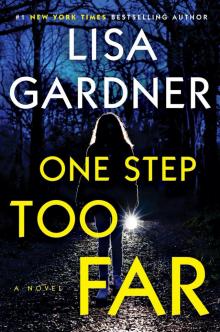 One Step Too Far
One Step Too Far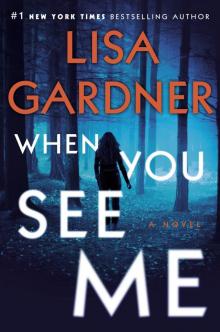 When You See Me
When You See Me Never Tell
Never Tell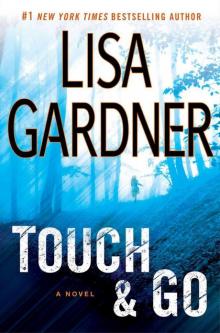 Touch & Go
Touch & Go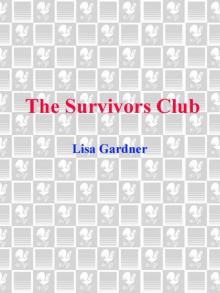 The Survivors Club
The Survivors Club MacNamara's Woman
MacNamara's Woman Love You More: A Novel
Love You More: A Novel Gone
Gone The Perfect Husband
The Perfect Husband Maggie's Man: A Family Secrets
Maggie's Man: A Family Secrets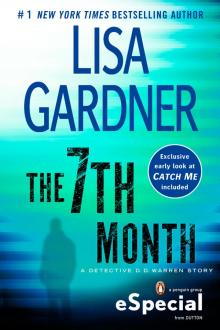 The 7th Month
The 7th Month The Neighbor
The Neighbor Hide
Hide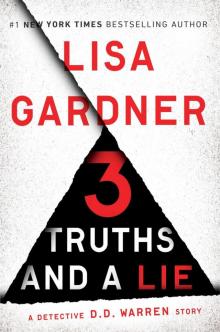 3 Truths and a Lie
3 Truths and a Lie Catch Me
Catch Me Fear Nothing: A Detective
Fear Nothing: A Detective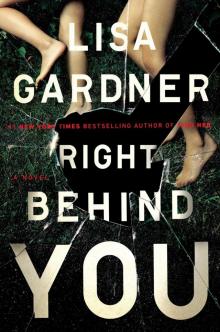 Right Behind You
Right Behind You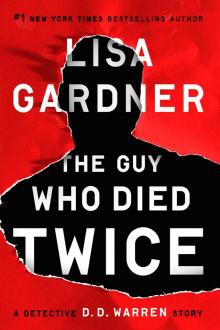 The Guy Who Died Twice
The Guy Who Died Twice Live to Tell: A Detective D.D. Warren Novel
Live to Tell: A Detective D.D. Warren Novel Live to Tell
Live to Tell Maggie's Man: A Family Secrets Novel
Maggie's Man: A Family Secrets Novel The Other Daughter
The Other Daughter Alone
Alone Crash & Burn
Crash & Burn The Detective D. D. Warren Series 5-Book Bundle
The Detective D. D. Warren Series 5-Book Bundle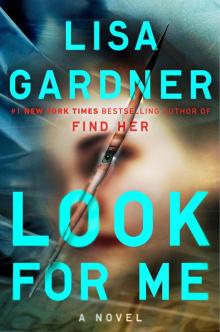 Look for Me
Look for Me Love You More
Love You More The FBI Profiler Series 6-Book Bundle
The FBI Profiler Series 6-Book Bundle The Third Victim (Quincy / Rainie)
The Third Victim (Quincy / Rainie) Say Goodbye
Say Goodbye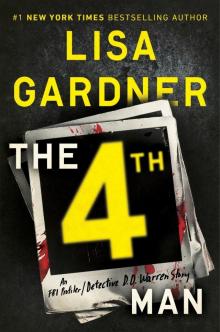 The 4th Man
The 4th Man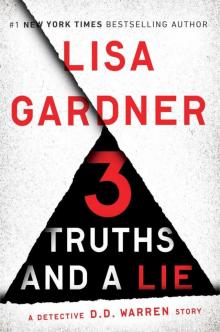 3 Truths and a Lie: A Detective D. D. Warren Story (Kindle Single)
3 Truths and a Lie: A Detective D. D. Warren Story (Kindle Single) Brandon's Bride
Brandon's Bride